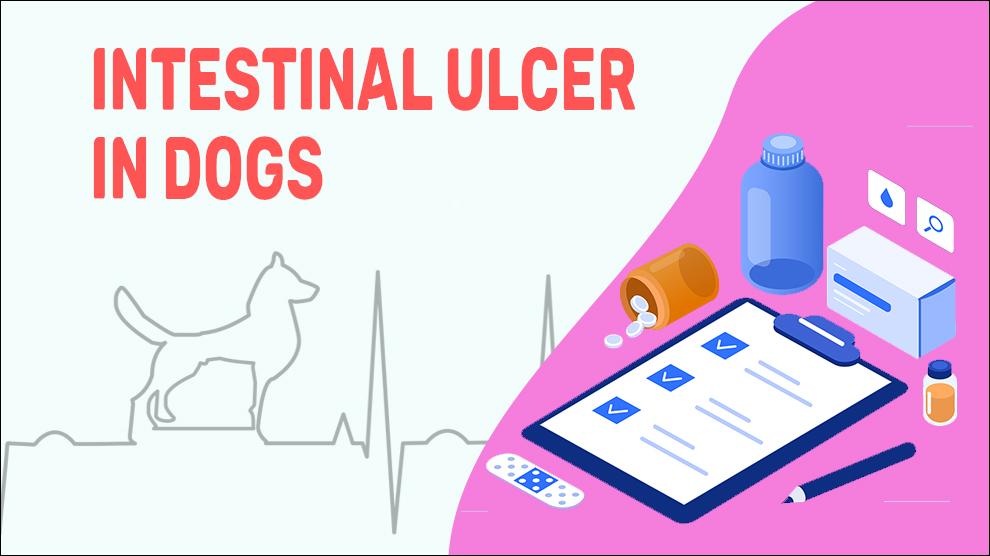Intestinal ulcers in dogs are more common than you would believe. The problem with canine intestinal ulcers is that they can’t tell us when they have burning stomach pain. The symptoms are understated and may often overlap or be misdiagnosed with other conditions.
Stomach ulcers are not age-specific and it is found in both young and old dogs. However, a higher percentage is typically found in athletic breeds and sled dogs.
The mucosal lining protects GI structures from ingested substances and digestive acids. The mucosal lining becomes compromised by excess production of acids, injury, or failure to regenerate itself resulting in damage to walls of the GI tract.
Most importantly, the problems that are often associated with ulcers are not well-described or understood in dogs.
Symptoms Of Intestinal Ulcer
- Anxiety or irritability
- “Bowing” posture often (Abdominal pain)
- Black or tarry stools(melena) /Diarrhea
- Chronic vomiting with or without bleeding(signs of “coffee grounds")
- Dehydration
- Excessive drooling
- Lack of appetite
- Lethargic behavior (Weakness)
- Pale gums
- Rapid heart rate (tachycardia)
- Weight loss
Treatment Options For Intestinal Ulcer
The Treatment depends upon the underlying cause and extent/severity of the problem.
Medications for medical conditions should be provided only as required.
Most intestinal ulcers can be healed successfully using acid-blocking and gastro-protectant medications.
Check with your vet for the minimal effective medication level. If vets suggest for medications be discontinued, they should be done immediately.
Prostaglandin E1 analog: These medications may be considered if NSAIDs are required long term. Misoprostol (Cytotec, Arthrotec) can decrease the harmful gastric effects of NSAIDs.
Supplements: quercetine Chalcone, L-glutamine, and probiotics to achieve optimal gut health.
Home Remedies For Intestinal Ulcer
When your dog is in a vulnerable group due to a situation or condition, providing required medications and feeding an antiulcer diet with supplements can be helpful in preventing ulcers from forming.
Herbs
Always discuss with the vet about these treatments before offering them to your dog.
Deglycyrrhizinated Licorice: 100 to 300 mg/daily depending on the size of the dog
Slippery elm: 100 milligrams per 10 pounds
Aloe vera:1 ml per kilogram bodyweight
Echinacea: 1.0 g/10 kg body weight
Alfalfa: small, medium dogs - 1 teaspoon daily; large dogs - 2 teaspoons daily
Prevention Of Intestinal Ulcer
- Protect your dog from infections, ingestion of toxins and hyperacidity
- Use pain relievers regularly for dogs with caution
- Use NSAIDsthat less likely to cause ulcer
- Avoid extreme exertion (sled dogs or other working dogs) as it can increase stomach acid that can overwhelm the mucosal barrier
- Change your dog's diet to control excess production of stomach acid
Affected Breeds Of Intestinal Ulcer
There is no breed predisposition.
Rottweiler, German Shepherd, Sled Dogs
Additional Facts For Intestinal Ulcer
Causes:
- Addison’s disease
- Adenocarcinoma (tumor in epithelial tissue)
- Allergies/ Adverse drug reaction
- Chronic gastritis
- Diet too high in fat
- Gastrinoma (gastrin secretion causing tumor in pancreas or duodenum)
- Exposure to certain drugs, especially long-term medications like NSAIDs or corticosteroids
- Helicobacter (chronic inflammation in the stomach)
- Hepatopathy (venous congestion in liver results from right-side heart failure)
- Hyperacidity of the stomach
- Irritable bowel syndrome
- Ingestion of poison or toxin
- Liver or kidney disease
- Lymphoma
- Mast cell tumors
- Pancreatitis
- Tumors of the pancreas or duodenum
- Viral or bacterial infection
Diagnosis:
- Complete blood count
- serum chemistry profile
- liver function test
- gastroscopy
- Ultrasound
Mortality:
In the last few decades, the mortality rate for intestinal ulcers has decreased modestly i.e. it is approximately 1 death/100,000 cases.
Pets with perforated stomach ulcers and peritonitis can result in death if left untreated.
Prognosis:
There would be some sort of visible improvement in your dog within a few days of treatment; however, healing from ulceration can take up to a few weeks.
The prognosis is excellent for stomach and intestinal ulcers (provided that the underlying cause can be treated successfully).
The prognosis may be more guarded if there have been kidney or liver complications. When there are tumors or abnormal cell growth, the outcome will depend upon the obliteration of the masses and overall the health status of your pet.
When To See A Vet
Contact your vet immediately, if you notice any of these signs:
In severe cases of ulcers in dogs:
- Anemia
- Blood in vomiting (hematemesis)
- Disorientation
- Loss of consciousness
- Shock
Food Suggestions For Intestinal Ulcer
How a canine anti-ulcer diet look like?
Start with bland, easily digestible foods.
Increase the frequency of feedings.
Frequent small meals will make your dog’s stomach full and can help stop acid from irritating the stomach lining.
Foods that tend to be high in salt, fatty meats, and white or processed foods should be cut off.
What to feed?
- Bland diet: boiled chicken, cooked rice, tofu, low-fat cottage cheese, boiled hamburger, canned tuna, etc
- Provide easily digestible lean cuts of meat. - (boiled and drained of excess fat)
- semi-moist pet food with boiled chicken or Meat-flavored baby food
- Low fat, plain yogurt
- Avoid hard treats, kibble, and biscuits
- High-fiber foods: whole grain bread, rice, cereal, green beans, peas, Beet Pulp
Conclusion
When there is an underlying reason for your pet’s stomach ulcer, such as a disease, infection, or cancer, then your vet may recommend further diagnosis as that condition must be treated in addition to the intestinal ulcer itself.
Mostly, the intestinal ulcer is treatable and is not fatal to the dog. However, untreated ulcers may lead to other complications like perforations in the stomach wall and anemia. When treated appropriately, intestinal ulcers won't cause danger to the pet’s life in most cases.

















